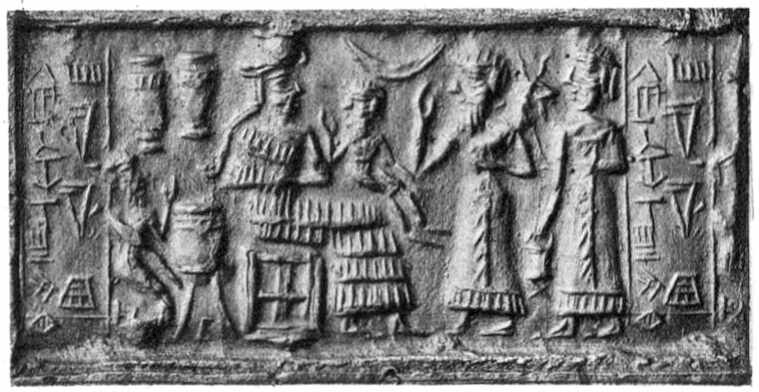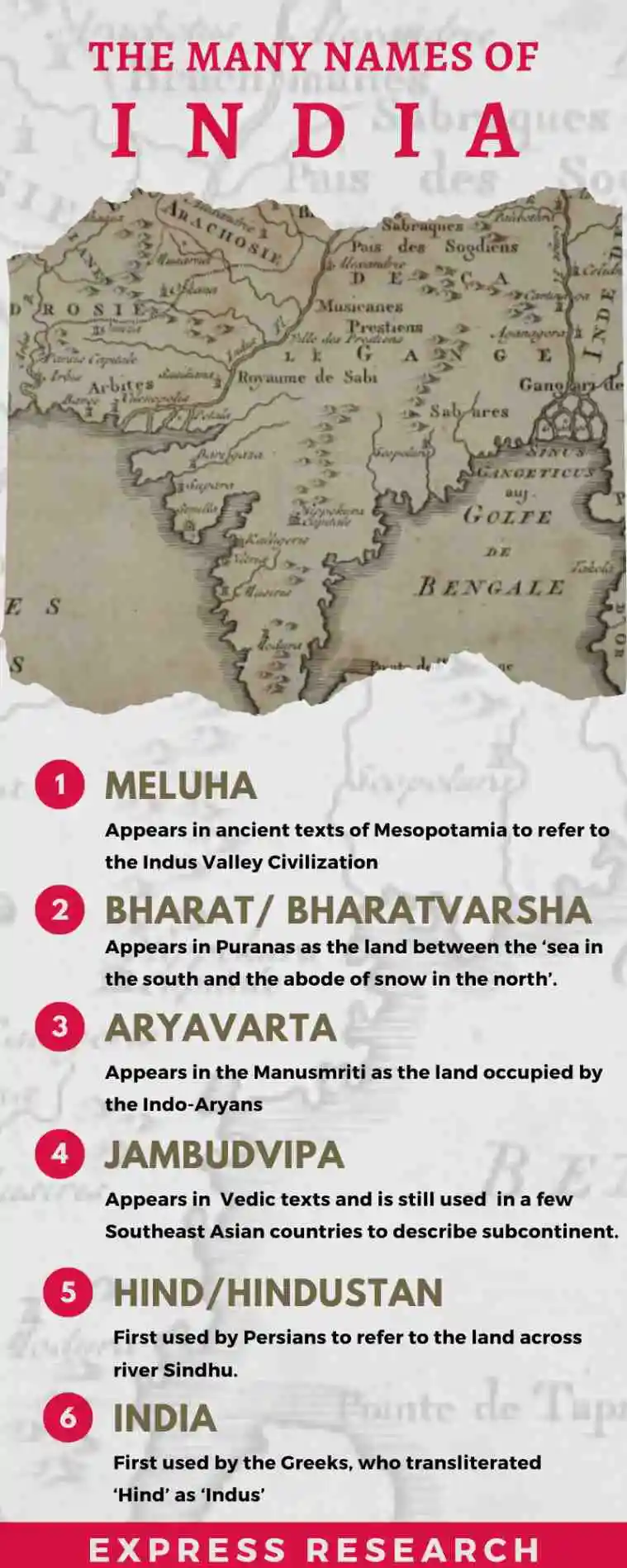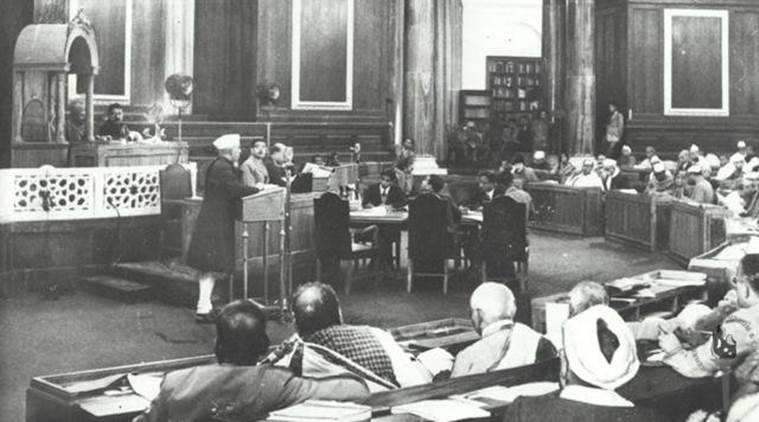 When the Constitution of the country was being prepared, a heated argument had ensued with regard to the naming of the country in a way that would be most suitable to the sentiments of its multicultural, vivacious population. (Source- Wikimedia Commons)
When the Constitution of the country was being prepared, a heated argument had ensued with regard to the naming of the country in a way that would be most suitable to the sentiments of its multicultural, vivacious population. (Source- Wikimedia Commons)
These words were written by Pandit Jawaharlal Nehru in ‘The discovery of India’, which he penned down as a tribute to the rich cultural heritage of the country that was just at the brink of being freed from the clutches of British rule. Nehru is believed to have consciously taken note of the different names that went into describing the idea of India, and the unity of its people that superseded all of them. Four years after the book was published, the Constitution of an Independent India came into force, its first Article, dropped one of the three names that Nehru had identified with the country, as it read- “India, that is Bharat, shall be a union of states’.
More than seven decades later, the nomenclature of the country, has once again become a topic of debate as a petition filed by a Delhi-based businessman, seeks to amend Article 1 of the Constitution, arguing that “The removal of the English name though appears symbolic, will instill a sense of pride in our own nationality, especially for the future generations to come”.
Also read- We can’t do it: CJI on PIL seeking exclusion of India as country name
“In fact, the word India being replaced with Bharat would justify the hard fought freedom by our ancestors,” claims the petition.
“The politics of naming is part of the social production of the nation. Its processes are shaped by broad socio-political conditions and can be studied from several angles.,” writes social scientist Catherine Clémentin-Ojha, in her article, ‘‘India, that is Bharat…’: One Country, Two Names’. For that matter, apart from the three most common names — India, Bharat, and Hindustan — used to designate the South Asian subcontinent, there are several other nomenclatures applied across different points in time, and from multiple socio-political points of view, to describe the geographical entity or parts of it that we now know as India. Consequently, when the Constitution of the country was being prepared, a heated argument had ensued with regard to the naming of the country in a way that would be most suitable to the sentiments of its multicultural, vivacious population.
The many names of India
It is important to note that in geographical terms, the space that is today referred to as India, was never a constant entity in the preceding centuries. However, scholars have often pointed out that one of the oldest names used in association with the Indian subcontinent was Meluha that was mentioned in the texts of ancient Mesopotamia in the third millennium BCE, to refer to the Indus Valley Civilisation.
 One of the oldest names used in association with the Indian subcontinent was Meluha that was mentioned in the texts of ancient Mesopotamia in the third millennium BCE, to refer to the Indus Valley Civilisation. (Source- Wikimedia Commons)
One of the oldest names used in association with the Indian subcontinent was Meluha that was mentioned in the texts of ancient Mesopotamia in the third millennium BCE, to refer to the Indus Valley Civilisation. (Source- Wikimedia Commons)
“Meluha, it is now generally agreed, was the name by which the Indus civilisation was known to the Mesopotamians: Meluha was the most distant of the trio of foreign lands, and the imports from Meluha mentioned in Sumerian and Akkadian texts, such as timbers, carnelian, and ivory, match the resources of the Harappan realms,” writes archaeologist Jane R. McIntosh in her book, ‘The ancient Indus Valley: New perspectives.’
But Meluha, of course, had lost currency way before modern political systems developed in the region. The earliest recorded name that continues to be debated is believed to be ‘Bharat’, ‘Bharata’, or ‘Bharatvarsha’, that is also one of the two names prescribed by the Indian constitution. While its roots are traced to Puranic literature, and to the Hindu epic, Mahabharata, the name’s popularity in modern times is also due to its sustained usage during the freedom struggle in slogans such as ‘Bharat mata ki jai’.
Bharata, writes Ojha, refers to the “supraregional and subcontinental territory where the Brahmanical system of society prevails”. Geographically, the Puranas mentioned Bharata to be situated between the ‘sea in the south and the abode of snow in the north’. Its shape and dimensions varied across different ancient texts. In that sense, Bharata, as explained by Ojha, was more of a religious and socio-cultural entity, rather than a political or a geographical one. Yet, on another note, Bharata is also believed to be the mythical founder of the race.

Apart from Bharat though, there are few other names associated with the country as well that trace their roots to Vedic literature. For instance, ‘Aryavarta’, as mentioned in the Manusmriti, referred to the land occupied by the Indo-Aryans in the space between the Himalayas in the north and the Vindhya mountain ranges in the south. The name ‘Jambudvipa’ or the ‘land of the Jamun trees’ has also appeared in several Vedic texts, and is still used in a few Southeast Asian countries to describe the Indian subcontinent.
Jain literature on the other hand, also lays claim to the name Bharat, but believes that the country was called ‘Nabhivarsa’ before. “King Nabhi was the father of Rishabhanatha (the first tirthankara) and grandfather of Bharata,” writes geographer Anu Kapur in her book, ‘Mapping place names of India’.
The name ‘Hindustan’ was the first instance of a nomenclature having political undertones. It was first used when the Persians occupied the Indus valley in the seventh century BCE. Hindu was the Persianised version of the Sanskrit Sindhu, or the Indus river, and was used to identify the lower Indus basin. From the first century of the Christian era, the Persian suffix, ‘stan’ was applied to form the name ‘Hindustan’.
At the same time, the Greeks who had acquired knowledge of ‘Hind’ from the Persians, transliterated it as ‘Indus’, and by the time the Macedonian ruler Alexander invaded India in the third century BCE, ‘India’ had come to be identified with the region beyond the Indus.
By the 16th century, the name ‘Hindustan’ was used by most South Asians to describe their homeland. Historian Ian J. Barrow in his article, ‘From Hindustan to India: Naming change in changing names’, writes that “in the mid-to-late eighteenth century, Hindustan often referred to the territories of the Mughal emperor, which comprised much of South Asia.” However, from the late 18th century onwards, British maps increasingly began using the term ‘India’, and ‘Hindustan’ started to lose its association with all of South Asia.
“Part of the appeal of the term India may have been its Graeco-Roman associations, its long history of use in Europe, and its adoption by scientific and bureaucratic organisations such as the Survey of India,” writes Barrow. “The adoption of India suggests how colonial nomenclature signalled changes in perspectives and helped to usher in an understanding of the subcontinent as a single, bounded and British political territory,” he adds.
The debate to name an Independent India
After the Independence of the country, the Constituent Assembly set up a drafting committee under the chairmanship of B R Ambedkar on August 29, 1947. However, the section, ‘name and territory of the Union’ was taken up for discussion only on September 17, 1949. Right from the moment the first article was read out as ‘India, that is Bharat shall be a union of states’, a division arose among the delegates.
Hari Vishnu Kamath, a member of the Forward Bloc suggested that the first article be replaced as ‘Bharat, or in the English language, India, shall be and such.’ Seth Govind Das, representing the Central Provinces and Berar, on the other hand, proposed: “Bharat known as India also in foreign countries”. Hargovind Pant, who represented the hill districts of the United Provinces, made it clear that the people of Northern India, ‘wanted Bharatvarsha and nothing else’.
 The section, ‘name and territory of the Union’ was taken up for discussion on September 17, 1949.
The section, ‘name and territory of the Union’ was taken up for discussion on September 17, 1949.
Pant made his argument in the following words: “So far as the word ‘India’ is concerned, the Members seem to have, and really I fail to understand why, some attachment for it. We must know that this name was given to our country by foreigners who, having heard of the riches of this land, were tempted towards it and had robbed us of our freedom in order to acquire the wealth of our country. If we, even then, cling to the word ‘India’, it would only show that we are not ashamed of having this insulting word which has been imposed on us by alien rulers.”
None of the suggestions were accepted by the committee. However, as Ojha, points out in her article, they “illustrated contrasting visions of the budding nation’.
It is worth noting though, that ‘Hindustan’ was hardly a contender in the debates. “Hindustan received different treatments during the constituent assembly,” writes Ojha. She adds that “three names had been at the start of the race, but at the end two had been placed on equal footing and one dropped.”
Also read: ‘Foolish’: Former law minister Veerappa Moily on idea of renaming India as ‘Hindustan’
The dispute over the naming of the country has come up several times after the adoption of the constitution as well. In 2005, for instance, a retired member of the IAS and a freelance journalist named V. Sundaram published an article asking to do away with the name ‘India’ and use ‘Bharat’ instead. “According to V. Sundaram, it is because ‘Bharat’ was thought to be too Hindu by the drafters of the Constitution that they introduced ‘India’ as a guarantee to the minorities that they would not be Hinduized. But, he argued, this was a misconception: the word Bharat carries no communalist overtones and therefore it should be the sole official name of the country,” writes Ojha.
In 2012, Shantaram Naik of the Indian National Congress proposed a bill in the Rajya Sabha with a similar suggestion. “”India” denotes a territorial concept, whereas “Bharat” signifies much more than the mere territories of India. When we praise our country we say, “Bharat Mata Ki Jai” and not “India ki Jai”,” he argued.
The most recent petition for the name change, has once again been rejected by the Supreme Court, stating that they cannot do it since “India is already called Bharat in the Constitution itself’. The court though, has suggested the petitioner to file his plea to the Centre instead.
Most Read 1Shell hikes diesel prices by Rs 20 a litre 2Asian Games 2023 Live Updates, Day 12: Dipika-Harinder claim India’s 20th gold; Jyothi and Co triumph in archery; Prannoy assured medal 3Self-made captain Rohit Sharma opens up: ‘Whatever I have created today, it’s because of myself… I didn’t expect anything from anyone’ 4AR Rahman issues legal notice to surgeons’ association seeking Rs 10 crore damages, unconditional apology 5Jawan box office collection day 27: Shah Rukh Khan’s all-time blockbuster is nearing KGF 2 and RRR’s worldwide gross
Whether the government goes on to make a choice between ‘India’ and ‘Bharat’, we are yet to see. What is certain though, is that they both might have very well been the most debated names in the Constituent Assembly, but were hardly the only ones representing the wide variety of ideas that have gone into nurturing and shaping India.
Further reading
The Ancient Indus Valley: New Perspectives by Jane McIntosh
‘India, that is Bharat…’: One Country, Two Names by Catherine Clémentin-Ojha
Also ReadHere is what happened in Kedarnath, and rest of Uttarakhand, in 2013A blank editorial: How The Indian Express protested censorship during Eme…From Vivekananda to Motilal Nehru: The Indian leaders believed to have jo…Here is everything you need to know about Indian Jews
From Hindustan to India: Naming Change in Changing Names by Ian J. Barrow
Mapping Place Names of India by Anu Kapur
© IE Online Media Services Pvt Ltd


